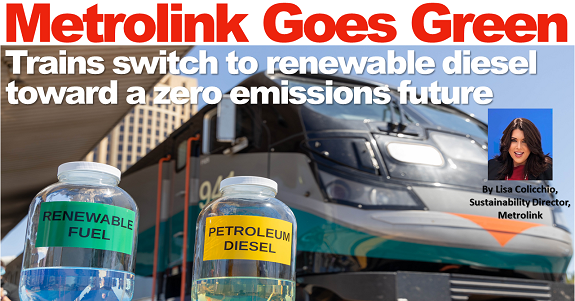Alternative Fuels are Today’s Solution Bridging the Gap Toward a Zero Emissions Future

By Lisa Colicchio, Sustainability Director, Metrolink
Special to The Digest
The Intergovernmental Panel on Climate Change (IPCC) recently released its newest report and it may be their most important work yet. The report looks at climate mitigation — that is, what governments, corporations and individuals can do to avert the climate cliff and there are options provided for all sectors to cut emissions by at least half by 2030.
Most importantly, the report’s findings conclude that it’s an existential imperative we wind down our dependence on fossil fuels as they contribute close to two-thirds of human-caused emissions.
According to statistics reported by the Environmental Protection Agency, the transportation industry in the U.S. accounts for 29 percent of greenhouse gas emissions. While technology for zero emissions of battery electric or hydrogen fuel cell equipment will take several years to mature to commercialization, low-carbon advanced biofuels made from renewable, non-food biomass can play an integral role in powering our nation during this technology electrification gap. Many advanced biofuels deliver up to 80 percent reduction in greenhouse gas emissions. Even more impressive than the emission reductions offered by advanced biofuels is the low cost required for transition. Advanced fuels are drop-in fuel replacements and require almost no change or equipment upgrades — meaning that they could be used to power heavy duty diesel engines in all transportation sectors without any significant investment
In California, use of alternative fuels such as renewable diesel has grown by 528% since 2013, displacing 618 million gallons of conventional diesel according to California Air Resources Board. Renewable diesel reduces particulate matter, a known cancer-causing pollutant, by about 30 percent compared to conventional diesel. A significant portion of California’s population, often communities of color, lives near or adjacent to transportation networks and has borne disproportionate air quality impacts from the combustion of conventional diesel fuel. The displacement and eventual phase out of conventional diesel combustion is critical to address this environmental justice issue.
Once again, Los Angeles was ranked at the top of the list for worst air quality of any major city in the US according to IQAir recent World Air Quality Report and the vast majority of the air pollution comes from tailpipe emissions. All tools in the toolbelt need to be used from policies to incentives to reduce passenger vehicle dependency and encourage increased ridership of public transportation.
Metrolink is well positioned with our 62 stations and expansive 538 route mile network to serve all southern California passengers so they can leave their cars behind and travel wherever they need to. While Metrolink is focused on reducing locomotive emissions to improve air quality for the region, the greater impact we have is the very service we provide. When customers choose to leave their car behind and ride the train, they displace far more emissions than Metrolink will ever produce.
At Metrolink, we recognize that climate change is one of the most important issues impacting our world today, and we realize that as a force of positive influence in our Southern California community, we have a responsibility to make improvements to our operating practices for the benefit of our riders and the environment. In order to meet the aggressive targets of Metrolink’s Climate Action Plan, a pilot test of renewable fuel was launched in early 2021. Renewable contains no petroleum as it is made of recycled natural fats and vegetable oils. It burns much cleaner and reduces harmful criteria pollutants, decreasing CO2 by up to 80%. This results from the biogenic cycle in which tailpipe CO2 emissions from burning renewable fuel is equal to the amount of CO2 those same renewable raw materials absorbed earlier in their natural state.
As of February 2022, we successfully accomplished our top short term Climate Action goal by taking the bold step to eliminate all petroleum-based fossil fuels in our locomotive fleet and fully transitioned to using natural, oil-based renewable fuel. We are the first rail agency in the nation to do so.
Metrolink’s current fuel supplier is Pinnacle, which sources renewable diesel from multiple providers. However, Metrolink uses strict fuel product specifications to maintain consistent renewable diesel quality and supply.
On average, Metrolink’s full feet of 55 locomotives are powered by 8 million gallons of fuel per year and by making the transition to renewable fuel, it significantly contributes to reducing impacts of climate change which is the equivalent of removing 13,900 passenger vehicles from the road for a year.
Due in large part to the progressive state policies of the Low Carbon Fuel Standard program, not only is this renewable fuel switch an environmental benefit, but Metrolink receives a financial benefit as the price per gallon is lower and reduces total operating expenses compared to standard diesel pricing. We hope that our bold actions are a catalyst for other heavy duty diesel engines, both on and off road, to step up and make the switch. The collective efforts of diesel engine operators from all industries will send strong market signals to renewable fuel suppliers to accelerate production to meet the growing demand.
While Metrolink trains are powered by 100 percent renewable sources today, this fuel is our bridge to a zero emissions future as we explore advanced technologies of battery electric and hydrogen fuel cell power. Currently a study is in process to develop a zero emissions implementation plan which will serve as a road map on how to conduct pilot test demonstrations and explore necessary infrastructure and facility investments required to accommodate future zero emissions equipment.
Category: Thought Leadership, Top Stories















